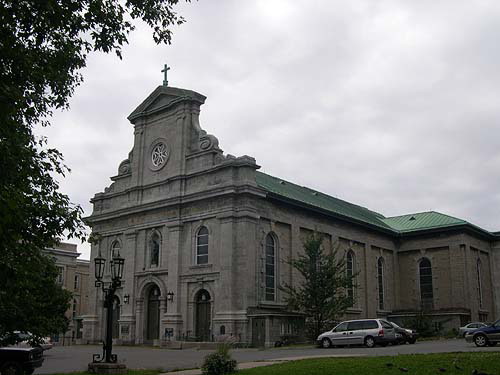A real estate developer who wants to demolish a former church in Notre Dame de Grâce and build houses on the site while allowing a Chabad centre to remain in the adjoining hall, thinks prejudice is motivating many of the project’s opponents.
Robert Blatt owns the property on Hingston Avenue near Notre Dame de Grâce Avenue with David Kakon. The Rohr Chabad of NDG are their tenants, but pay no rent.
Blatt told The CJN that in a year of public consultation, he has received many calls and emails about the project, and the majority have questioned whether the proposed seven single-family dwellings will be reserved for members of the Chabad-Lubavitch community.
Blatt said the inquirers give the impression they don’t want that to happen.
READ: VANDALS DEFACE LAVAL HOMES, CARS WITH SWASTIKAS
He said opponents have repeatedly brought up the same concern at the monthly Côte des Neiges-NDG borough council meetings. Blatt believes the opponents’ claims that they are only concerned with preserving a building for its heritage value, or with keeping it for community use, do not tell the whole story.
“That the Jewish element should be brought into this, that they object to the presence of a Jewish organization, is extremely upsetting,” he said. “And this is in a community [NDG] that prides itself on its multicultural character.”
Blatt said there is no deal between the developers and Chabad that would give it priority to purchase the homes. He said the houses would be on the open market.
Blatt recalled that at a public consultation meeting last October, a man made a Nazi salute and yelled “Heil Copeman” after borough mayor Russell Copeman responded positively to a Chabad rabbi’s vow to address complaints about noise that were made by several people there.
Monique Charpentier, speaking for opponents, at the time dissociated her group from the incident and called it “unacceptable behaviour.”
On March 17, more than 200 area residents signed a registry opened by the borough on the project’s future. The minimum needed was 166 signatures to delay the razing of the former St. Columba Church, a century-old building.
The Montreal executive committee authorized the demolition in January.
The registry is to be presented at the borough council meeting on April 4. At its next meeting on May 2, the council is expected to decide whether to hold a referendum or rescind the zoning law changes that would have allowed the project to go ahead.
Blatt said he has been informed by someone associated with the borough council, whom he did not name, that there will be no referendum.
The district’s councillor, Peter McQueen, confirmed that the project is effectively dead. “With 223 people signing the registry, it is clear that it is not just a few people who are against this.” He said it is unlikely the borough council will opt for a referendum, an exercise that would be “divisive” and costly, and likely yield the same result.
McQueen voted for the project with some reluctance because he, too, regrets the disappearance of a historic church. He said anti-Semitism may be a factor in the opposition, and he was appalled by the “insane” Nazi salute incident, but he thinks most opponents are motivated by a genuine concern for the heritage site.
“Clearly, there was one individual who is anti-Semitic… and there may be a few others, but I wouldn’t tar everyone with the same brush.”
Blatt would not confirm what his and Kakon’s plans are – whether they will sell the property or come up with new development plans. He described the church building as in disrepair and said the developers have no intention of maintaining a property for community use.
But he did indicate that Chabad will not be able to remain in the building. “We are private developers who have invested millions,” Blatt said. “We are trying to obtain a return on our investment… We wanted to do a community service [by giving Chabad the space], but we are not a charity.”
The Chabad centre has been occupying the hall since September 2013.
Under the project, the hall would have been preserved. It has also been home for some 35 years to a public daycare centre, not associated with the Jewish community.
The NDG Chabad moved to the former church from Monkland Avenue, where it had been located for about five years. As it steadily grew, it moved three times.
Its founder and director Rabbi Yisroel Bernath said a much larger space – and ideally one of its own – was needed to accommodate the increasing number of participants in its services and activities, many of them young professionals and families, as well as students from Concordia University’s Loyola campus. The former St. Columba seemed ideal, but Chabad did not have the money to buy the property, so they looked for private partners.
READ: DESPITE BUS ISSUE, PURIM PEACEFUL THIS YEAR IN OUTREMONT
Kakon and Blatt bought the property from the Anglican diocese and gave Chabad 18 months to purchase the section they are using, a space of approximately 5,000 square feet. Chabad was not able to raise the approximately $1 million that it needed to buy its portion and renovate it.
During the centre’s 2-1/2 years on Hingston, Rabbi Bernath has said he has received complaints from neighbours about noise. He is not certain that all were founded, and fears anti-Semitism may be behind some of them.
Rabbi Bernath did not return messages from The CJN for comment on the situation since the March 17 registry outcome
The church, which was deconsecrated in 2012, did have a designation of heritage interest from the City of Montreal, but at the lowest level on its rating scale. That value was judged less on architectural merit, than on the congregation’s history in the neighbourhood.
